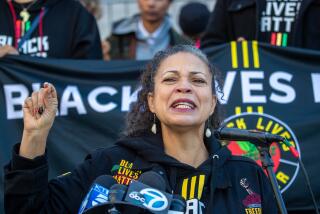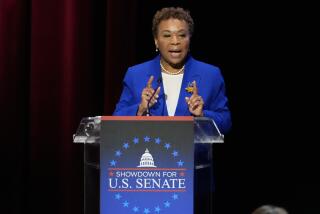Profile : One-Woman Battle : Politician Toujan Faisal takes on Muslim fundamentalists in Jordan.
- Share via
AMMAN, Jordan — For the past 10 days, Toujan Faisal had sat before packed hotel ballrooms, trade union halls and private living rooms throughout the conservative Jordanian capital, justifying her marriage, her honor, her work and, mostly, her one-woman political crusade against a regional tide of Islamic fundamentalism.
No, Faisal found herself telling prospective voters time and again last week, she does not advocate female polygamy--multiple husbands for women--as the fundamentalists have charged.
No, she is not an atheist who should have been jailed, forcibly divorced or put to death years ago, as Jordan’s religious courts have charged.
And no, those who vote for her will not go to hell, as several Muslim clerics have maintained throughout her well-educated home district in central Amman.
But yes, her candidacy for one of the 80 parliamentary seats at stake today, when the results of Monday’s crucial election are announced, is, indeed, a personal crusade against a powerful national fundamentalist force that Faisal calls “a cancer in our society.”
Win or lose, the feisty and articulate newspaper columnist and former TV commentator concluded in an interview in her Amman apartment last week, Toujan Faisal already has set a precedent for change and established herself as a powerful, charismatic symbol of both women’s and human rights in a region where there is little of either.
“This is going to have a lasting effect,” she said, explaining her second bid for Parliament in four years. “If I can do it, others will do it also. In a way, it has started a method, a system of change in our society.
“I’m a woman who has run twice against the two major forces in the country--the fundamentalists and the former martial-law forces. And for the fundamentalists, of course, I am opening doors that are very dangerous for them.”
The very fact that Jordanian political analysts gave Faisal even a remote chance of victory is, in itself, an important sign of the times in a nation fast emerging as one of the Middle East’s most progressive states.
Indeed, most Jordanian analysts predicted last week that whether Faisal wins or loses, the fundamentalists, who emerged as the largest single bloc in Parliament during the kingdom’s first elections in 1989, would lose at least some of their influence when the dust from Monday’s balloting by Jordan’s 1.5 million voters settles.
Part of what these analysts see as a trend against political Islam, they said, is rooted in changes in Jordan’s election law that work against the Islamists in securing seats and building coalitions. But much of it equally is based on a popular sense that the Islamist-led Parliament did little or nothing to deliver on its own promises of change during the past four years. And that, at least, is a perception Faisal has come to symbolize more than most of the 550 candidates in the fray.
At 44, she has bucked the ancient Bedouin and Palestinian traditions that surround her--not merely on the political stage but in her personal life. For the past several years, she has raised her young son and two daughters single-handedly in a modest two-bedroom apartment, relying largely on her meager income from her Arabic-language newspaper columns--the main forum for her vitriolic campaign against fundamentalism.
Faisal insists that her crusade against the fundamentalist Muslim Brotherhood--which has accused her nine times with crimes against Islam in the government’s religious courts--contributed heavily to her family’s financial woes.
Her husband, a gynecologist, was forced to sell his clinic at a loss when fundamentalist pressure kept patients away. Faisal asserted that the Brotherhood also pressured the cancellation of her husband’s subsequent work contract in Saudi Arabia. He now works in Libya, one of the few countries, she said, where the fundamentalists hold little sway.
In fact, Faisal is simply grateful that she and her husband are still married after a concerted effort by the Brotherhood to force their divorce.
In what became one of Jordan’s most celebrated tests of Islamic Sharia law, Faisal and her husband found themselves having to defend their union before a religious judge after the Brotherhood charged that she, an atheist, could not remain married to a believer. It was only after Faisal studied every word of the Islamic holy book, the Koran, and pored over the Sharia that she successfully defended her faith and won the case.
“I have studied the Sharia very deeply,” she said. “I present an even stronger case than they do because I use the same books to defend myself that they use to attack me.”
Asked why she decided to declare war on the fundamentalists, Faisal responded quickly, “They’re the ones who started it.” But it goes deeper than that, she admitted. “I do think this is one of the greatest dangers facing our society. It is like a cancer. And it has to be surgically removed, because, for any society, strength or weakness comes from inside.”
Faisal’s campaign against the Jordanian Islamists--who sent shivers through secular regimes in the Arab world as well as the West when they became the first Islamic fundamentalist force to gain significant political power through the polls four years ago--actually dates back nearly a decade.
As a reporter and on-camera news presenter for state-run Jordan Television, Faisal starred in documentaries that advocated a wide array of human rights, women’s rights chief among them. Her yearlong series in 1988-89, titled “Women’s Issues,” particularly enraged Jordan’s fundamentalist leaders with its frequent exploration of problems such as wife beating and inequities in Jordan’s inheritance and divorce laws.
To understand the controversy ignited by such issues--indeed, the controversy over Faisal’s very candidacy for Parliament--it is necessary to understand the great gulf between traditional views of women in most of this part of the world and in the West.
A field survey called The Jordanian Woman’s Participation in Political Life, published in September by Jordan University’s prestigious Center for Strategic Studies, sampled the opinions of 1,000 rich, poor and middle-class families across the kingdom. Among its findings: * More than 77% of the men and women polled said they are convinced that men are more capable of making decisions than women;
* Fewer than 20% said they believe that women in general are capable or qualified for political work;
* Nearly 60% said there are obstacles standing in the way of women participating in Jordan’s political life, with the majority of them listing “men’s opposition” as the most insurmountable;
* Still, 57% said they believed there are some Jordanian women capable of serving successfully in high political posts provided the obstacles are removed.
And it is that last statistic that Faisal and her growing ranks of deeply committed and mostly young supporters said she is targeting--not merely for votes, but as fertile ground to plant the seeds of change.
“If a woman stands up and does it, then the women will support her,” Faisal said. “It will also inspire other women to stand up and do the same.”
Ironically, perhaps, it already has--in Faisal’s own district and within her own ethnic Circassian community. The Circassians, descendants of Soviet Muslim migrants to Jordan from the 1920’s have several seats reserved for them in Parliament. And one of Faisal’s two opponents for the Circassian seat in her district was Jeanette Mufti, a more conservative woman whose low-key approach appeals to an ethnic minority long known for its resistance to change and its fierce loyalty to Jordan’s secular King Hussein.
“Many women have been trying to convince one of us to step down,” Faisal said in the interview during the final hours of campaigning. “But as I told them, I’m not just a women’s candidate. I’m a politician. I’m fighting for other things as well. I’m fighting for human rights. And the issues I stand for are larger than this.”
Biography
* Name: Toujan Faisal
* Titles: Politician and newspaper columnist
* Age: 44
* Personal: Born in Amman. Member of Circassian Muslim minority. Master’s degree in English literature, Jordan University. Former on-camera reporter for state-run Jordan television. Held various social-services posts. Married to Ibrahim Mohammad abu Adel, a gynecologist. Son, 14; two daughters, 11 and 5.
More to Read
Sign up for Essential California
The most important California stories and recommendations in your inbox every morning.
You may occasionally receive promotional content from the Los Angeles Times.













